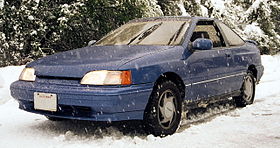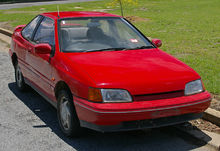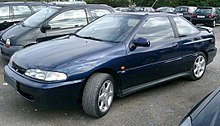Hyundai Scoupe
hideThis article has multiple issues. Please help improve it or discuss these issues on the talk page. (Learn how and when to remove these template messages)
(Learn how and when to remove this template message)
|
| Hyundai Scoupe | |
|---|---|
 | |
| Overview | |
| Manufacturer | Hyundai Motor Company |
| Production | 1990–1995 |
| Assembly | Ulsan, Korea |
| Designer | Park Jong-Seo[1] |
| Body and chassis | |
| Class | Sports car |
| Body style | 2-door coupe |
| Layout | FF layout |
| Related | Hyundai Excel |
| Powertrain | |
| Engine | 1.5L 92 hp (69 kW) I4 1.5L 115 hp (86 kW) I4 |
| Transmission | 4-speed automatic 5-speed manual |
| Dimensions | |
| Wheelbase | 93.8 in (2,383 mm) |
| Length | 165.9 in (4,214 mm) |
| Width | 1990-92: 64.0 in (1,626 mm) 1993-95: 63.9 in (1,623 mm) |
| Height | 50.0 in (1,270 mm) |
| Chronology | |
| Successor | Hyundai Tiburon |
The Hyundai Scoupe was a 2-door coupé based on the Hyundai Excel. The name, a portmanteau of "sporty" and "coupe," was pronounced "scoop". In the UK and other countries it is known as an "S Coupé". It was sold in the US from December 1988 through 1995. An 81 horsepower, 1.5L Mitsubishi sourced I4 engine provided power to the front wheels via a 5-speed manual or 4-speed automatic transmission.
Several changes came for 1993, when Scoupes got a facelift, including the current Hyundai "H" logo, new flush headlamps plus body-colored side moldings and redesigned front sheetmetal, taillights, and rear bumper. The Base and LS models came with a new and improved, In-house manufactured, 1.5L 12-valve, direct-port fuel-injected engine, called "Alpha". The 1,495 cc Alpha, with a 75.5 mm (2.97 in) bore and an 83.5 mm (3.29 in) stroke, produced 92 hp (69 kW) at 5,500 rpm and 97 lb⋅ft (132 N⋅m) of torque at 4,000 rpm in naturally aspirated form, with a 10:1 compression ratio, and 115 hp (86 kW) at 5,500 rpm and 123 lb⋅ft (167 N⋅m) of torque at 4,500 rpm when turbocharged, with a 7.5:1 compression ratio.[2] Turbos came only with 5-speed manual shift, while Base and LS models could have an optional 4-speed automatic.
The Australian spec S-Coupe GT Turbo has been road tested by several Australian magazines, returning times of 9.2-9.3 secs for 0–100 km/h and 16.8 secs for the 0–400 m dash.[citation needed]
Hyundai says the Scoupe was the first production application for Garrett Automotive Products' T15 turbocharger, which was new for the early 1990s. The turbo unit includes water-cooled bearings and housings and an integral wastegate.
The naturally aspirated Alpha boasts a 14% increase in power over its 1.5L Mitsubishi-designed predecessor, and the turbo produces 42% more power.
A Lotus-tuned suspension[3] was installed in both Base and LS models, while a slightly firmer strut valving was used in the GT. This, combined with the 2,176 lb (987 kg) curb weight made the car an interesting driving sport compact considering the low MSRP.[original research?]
The GT's EPA was 27 miles per US gallon (8.7 L/100 km; 32 mpg‑imp) city, and 33 miles per US gallon (7.1 L/100 km; 40 mpg‑imp) highway.
The 1988-92 "Base" models achieved 26 miles per US gallon (9.0 L/100 km; 31 mpg‑imp) city and 34 miles per US gallon (6.9 L/100 km; 41 mpg‑imp) Hwy for Manual Trans, and 25 miles per US gallon (9.4 L/100 km; 30 mpg‑imp) city and 32 miles per US gallon (7.4 L/100 km; 38 mpg‑imp) for Automatic.
For 1993 the Scoupe received a facelift and Hyundai's first internally developed engine. The 1993-95 "Base" Alpha 1.5 engine models achieved 28 miles per US gallon (8.4 L/100 km; 34 mpg‑imp) city 36 miles per US gallon (6.5 L/100 km; 43 mpg‑imp) Hwy for Manual Trans and 25 miles per US gallon (9.4 L/100 km; 30 mpg‑imp) City and 34 miles per US gallon (6.9 L/100 km; 41 mpg‑imp) for Automatic.
The car was replaced by the Tiburon in 1996.
This car made an appearance on BBC Top Gear Series 13 Episode 2 as Richard Hammond's car for the challenge where the presenters are finding the perfect car for a 17-year-old driver.
Scoupe Turbo[edit]
The Scoupe GT (LS Turbo in the USA) was Hyundai's first attempt at a sports car and featured South Korea's first domestically designed engine with a cast-iron block and crankshaft. The engine contains an aluminum head, aluminum pistons and steel connecting rods. A special compact pentroof combustion chamber design with central spark plug location was incorporated to optimize engine efficiency. The engine utilizes a Robert Bosch GmbH electronic engine control system and a knock sensor.[citation needed]
References[edit]
- ^ Chung, Kyung-Won. "Hyundai Motor Company: Design Takes the Driver's Seat" (PDF). Design Management Institute. Retrieved 18 November 2019.
- ^ "Ward's Auto World, September 1992, at". Hyundaiclub.net. Retrieved 2011-05-11.
- ^ "HYUNDAI MOTOR AMERICA - A BRAND HISTORY". HyundaiNews.com. February 2011. Retrieved 4 January 2015.
| Wikimedia Commons has media related to Hyundai S Coupé. |
| show Hyundai road vehicle timeline, North American market, 1984–present
|
|---|


